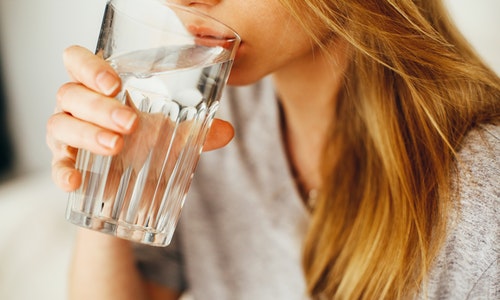
Did you know that your body is about 60% water…and that your blood is 90% water?
And yet very few of us (maybe only 20%) actually drink 8 or more cups of refreshing, rejuvenating water every day!
We all know that drinking water is good for us, yet far too many people are walking around dehydrated.
What is dehydration?
Dehydration is your body’s reaction when you don’t drink enough water, resulting in a fluid deficiency. Chronic dehydration is a condition when dehydration recurs for longer periods, sometimes regardless of how much fluid you take in on a particular day.
People are generally prone to mild dehydration under certain circumstances, such as prolonged periods of physical activity or during extreme heat exposure. Mild dehydration can be resolved by resting and drinking water.
Chronic dehydration, however, goes beyond the point of simply using more fluid than you take in. Instead, it becomes an ongoing issue where you’re forcing your body to function without enough water. Chronic dehydration, when severe enough, may require medical attention.
How does dehydration affect body and mind?
Our body is continually losing water through breath, urine, feces, and skin. Most healthy people are able to regulate their body’s water level remarkably well through eating and drinking, and are guided by appetite and thirst.
However, when too much water is lost from the body, our organs, cells, and tissue fail to function as they should, which may lead to complications depending upon the severity of dehydration.
Signs of mild dehydration may include:
- Increased thirst
- Muscle cramps
- Dark colored urine
- Dry eyes
- Feeling sleepy
While signs of chronic dehydration may show up as:
- Dry or flaky skin
- Constipation
- Frequent headaches
- Lack of concentration
- Chronic fatigue
It’s easy to understand why everything in your body needs enough water to function properly.
Not only that, your body functions BETTER when you’re hydrated…it will:
- Help you maintain a healthy body weight
- Help boost your energy by moving oxygen and fuel so they can be used where they are needed
- Help with digestion, starting with the moment you eat something
- Help improve the quality of your skin, making it glowing and radiant
- Help your immune system function optimally
- Help prevent depression
- Help you get rid of toxins in your body
- Help keep your joints lubricated, helping avoid joint pain
- Help cushion your brain and protect your nervous system
- Help regulate your body temperature - super important when you work out or are in hot weather!
How much water do you need to drink daily?
There are numerous opinions out there about how much water we need to drink each day – because we’re all different, with different needs based on our size, body composition, activity level, how sweaty we get, and more!
That being said, the National Academies of Sciences, Engineering, and Medicine says the adequate daily fluid intake is:
- About 15.5 cups (3.7 liters) of fluids for men
- About 11.5 cups (2.7 liters) of fluids a day for women
The end goal is to drink at least half your body weight in ounces of water…and water you drink during your workouts doesn’t count.
Conclusion
Take charge of your hydration starting today, and you will be one step closer to achieving your health goals. Your body, skin, and energy levels will thank you.
Are you ready to discover how simple habits, like drinking more water, can transform your body and help you establish the healthy lifestyle you desire? Join my FREE 7-Day Healthy Habits Challenge starting on Monday, January 20th. Invite a friend and sign up today! Click here to learn more.
References:
https://www.nap.edu/read/10925/chapter/6#116
https://www.medicalnewstoday.com/articles/290814.php#benefits
https://www.healthline.com/health/chronic-dehydration#outlook